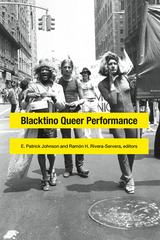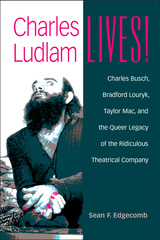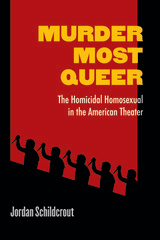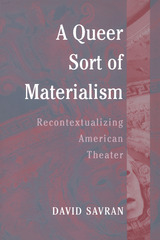4 books about Homosexuality in the theater

Blacktino Queer Performance
E. Patrick Johnson and Ramón H. Rivera-Servera, editors
Duke University Press, 2016
Staging an important new conversation between performers and critics, Blacktino Queer Performance approaches the interrelations of blackness and Latinidad through a stimulating mix of theory and art. The collection contains nine performance scripts by established and emerging black and Latina/o queer playwrights and performance artists, each accompanied by an interview and critical essay conducted or written by leading scholars of black, Latina/o, and queer expressive practices. As the volume's framing device, "blacktino" grounds the specificities of black and brown social and political relations while allowing the contributors to maintain the goals of queer-of-color critique. Whether interrogating constructions of Latino masculinity, theorizing the black queer male experience, or examining black lesbian relationships, the contributors present blacktino queer performance as an artistic, critical, political, and collaborative practice. These scripts, interviews, and essays not only accentuate the value of blacktino as a reading device; they radiate the possibilities for thinking through the concepts of blacktino, queer, and performance across several disciplines. Blacktino Queer Performance reveals the inevitable flirtations, frictions, and seductions that mark the contours of any ethnoracial love affair.
Contributors. Jossiana Arroyo, Marlon M. Bailey, Pamela Booker, Sharon Bridgforth, Jennifer Devere Brody, Cedric Brown, Bernadette Marie Calafell, Javier Cardona, E. Patrick Johnson, Omi Osun Joni L. Jones, John Keene, Lawrence La Fountain-Stokes, D. Soyini Madison, Jeffrey Q. McCune Jr., Andreea Micu, Charles I. Nero, Tavia Nyong'o, Paul Outlaw, Coya Paz, Charles Rice-González, Sandra L. Richards, Matt Richardson, Ramón H. Rivera-Servera, Celiany Rivera-Velázquez, Tamara Roberts, Lisa B. Thompson, Beliza Torres Narváez, Patricia Ybarra, Vershawn Ashanti Young
[more]

Charles Ludlam Lives!
Charles Busch, Bradford Louryk, Taylor Mac, and the Queer Legacy of the Ridiculous Theatrical Company
Sean F. Edgecomb
University of Michigan Press, 2017
Playwright, actor and director Charles Ludlam (1943–1987) helped to galvanize the Ridiculous style of theater in New York City starting in the 1960s. Decades after his death, his place in the chronicle of American theater has remained constant, but his influence has changed. Although his Ridiculous Theatrical Company shut its doors, the Ludlamesque Ridiculous has continued to thrive and remain a groundbreaking genre, maintaining its relevance and potency by metamorphosing along with changes in the LGBTQ community.
Author Sean F. Edgecomb focuses on the neo-Ridiculous artists Charles Busch, Bradford Louryk, and Taylor Mac to trace the connections between Ludlam’s legacy and their performances, using alternative queer models such as kinetic kinship, lateral historiography, and a new approach to camp. Charles Ludlam Lives! demonstrates that the queer legacy of Ludlam is one of distinct transformation—one where artists can reject faithful interpretations in order to move in new interpretive directions.
Author Sean F. Edgecomb focuses on the neo-Ridiculous artists Charles Busch, Bradford Louryk, and Taylor Mac to trace the connections between Ludlam’s legacy and their performances, using alternative queer models such as kinetic kinship, lateral historiography, and a new approach to camp. Charles Ludlam Lives! demonstrates that the queer legacy of Ludlam is one of distinct transformation—one where artists can reject faithful interpretations in order to move in new interpretive directions.
[more]

Murder Most Queer
The Homicidal Homosexual in the American Theater
Jordan Schildcrout
University of Michigan Press, 2014
The “villainous homosexual” has long stalked America’s cultural imagination, most explicitly in the figure of the queer murderer, a character in dozens of plays. But as society’s understanding of homosexuality has changed, so has the significance of these controversial characters, especially when employed by LGBT theater artists themselves to explore darker fears and desires. Murder Most Queer examines the shifting meanings of murderous LGBT characters in American theater over a century, showing how these representations wrestle with and ultimately subvert notions of gay villainy.
Murder Most Queer works to expose the forces that create the homophobic paradigm that imagines sexual and gender nonconformity as dangerous and destructive and to show how theater artists—and for the most part LGBT theater artists—have rewritten and radically altered the significance of the homicidal homosexual. Jordan Schildcrout argues that these figures, far from being simple reiterations of a homophobic archetype, are complex and challenging characters who enact trenchant fantasies of empowerment, replacing the shame and stigma of the abject with the defiance and freedom of the outlaw, giving voice to rage and resistance. These bold characters also probe the darker anxieties and fears that can affect queer lives and relationships. Instead of sentencing them to the prison of negative representations, this book analyzes the meanings in their acts of murder, confronting the real fears and desires condensed in those dramatic acts.
[more]

A Queer Sort of Materialism
Recontextualizing American Theater
David Savran
University of Michigan Press, 2003
In engaging, accessible prose, leading theater critic and cultural commentator David Savran explores the intersections between art and culture, offering smart, compelling interpretations of the economic and social contexts of theatrical texts and practices. Acknowledging theater's marginal status in U.S. culture, A Queer Sort of Materialism takes on "the trouble-makers--the ghost, closeted homosexual, masochist, drag king, Third World laborer, even the white male as victim"--who figure more prominently in theater than in other cultural forms. In impeccably researched and argued essays that range in subject matter from Rodgers and Hammerstein to Paula Vogel, from Suddenly Last Summer to Iron John, Savran uncovers the ways that such troublemakers both challenge and reinforce orthodox social practices.
The selections presented here are by turns entertaining, informative, sophisticated, and polemical, reflecting the author's dual citizenship as rigorous scholar and engaging theater critic. This book also provides a model for a kind of queer historical materialism that will prove useful to a wide range of disciplines, including theater and performance, gender and sexuality, queer/gay/lesbian/transgender studies, American studies, and popular culture.
David Savran is Professor of Theater, the Graduate Center, the City University of New York, and author of Cowboys, Communists, and Queers and Taking It Like a Man.
The selections presented here are by turns entertaining, informative, sophisticated, and polemical, reflecting the author's dual citizenship as rigorous scholar and engaging theater critic. This book also provides a model for a kind of queer historical materialism that will prove useful to a wide range of disciplines, including theater and performance, gender and sexuality, queer/gay/lesbian/transgender studies, American studies, and popular culture.
David Savran is Professor of Theater, the Graduate Center, the City University of New York, and author of Cowboys, Communists, and Queers and Taking It Like a Man.
[more]
READERS
Browse our collection.
PUBLISHERS
See BiblioVault's publisher services.
STUDENT SERVICES
Files for college accessibility offices.
UChicago Accessibility Resources
home | accessibility | search | about | contact us
BiblioVault ® 2001 - 2024
The University of Chicago Press









